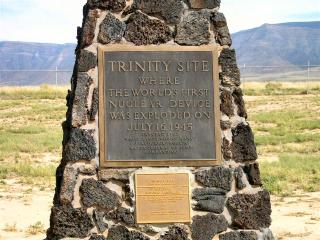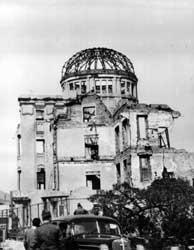 Today is the 60th anniversary of the first atomic explosion at the Alamogordo test site in New Mexico. This history-altering event and the subsequent use of this devastating weapon three weeks later is the subject of Pika-Don, a composition for percussion and pre-recorded tape by James Tenney. I was a student when Tenney was writing this work. I remember the aesthetic issues that he would discuss openly as he struggled to balance the different components of this piece in a manner that would address the humanity of these profound events. I recognize so many of the voices from pleasant Sunday afternoons spent at Tenney's weekly open-house/salon gatherings and many new music concerts at the Music Gallery. As a teacher and as a composer he was setting an example by consistently applying his thoughtful energy and honest convictions toward this piece. I graduated and moved on before hearing the final work. Hearing Pika-Don performed by the Maelstrom Percussion Ensemble is a fitting observance of this dark anniversary.
Today is the 60th anniversary of the first atomic explosion at the Alamogordo test site in New Mexico. This history-altering event and the subsequent use of this devastating weapon three weeks later is the subject of Pika-Don, a composition for percussion and pre-recorded tape by James Tenney. I was a student when Tenney was writing this work. I remember the aesthetic issues that he would discuss openly as he struggled to balance the different components of this piece in a manner that would address the humanity of these profound events. I recognize so many of the voices from pleasant Sunday afternoons spent at Tenney's weekly open-house/salon gatherings and many new music concerts at the Music Gallery. As a teacher and as a composer he was setting an example by consistently applying his thoughtful energy and honest convictions toward this piece. I graduated and moved on before hearing the final work. Hearing Pika-Don performed by the Maelstrom Percussion Ensemble is a fitting observance of this dark anniversary."Part I: Alamogordo" opens with a quiet rattle, bowed cymbals and soft mallets on wood blocks. The percussion continues to paint in light strokes as male voices deliver eye-witness accounts of that July 16, 1945 test in the desert. The voices often overlap one
 another. At times they clear up to reveal a particular observation leading up to the explosion. Each of these accounts has a quality of detatched awe at the culmination of these efforts carried out in secrecy and isolation.
another. At times they clear up to reveal a particular observation leading up to the explosion. Each of these accounts has a quality of detatched awe at the culmination of these efforts carried out in secrecy and isolation."Part II: Hiroshima" is set up with the final male voice delivery depicting the image of an "umbilical cord of death" reaching into a city of Hiroshima. The percussion takes on an eerie quiet, pianissimo of soft tambourine, wood chimes and rattles before several female voices enter with eye-witness accounts of August 6, 1945 in Hiroshima, Japan. The "awe" of the scientists in part I gives way to the overwhelming consequence and human toll. The dynamic range of the percussion opens up like a shock-wave of energy sweeping indiscrimately across a civilian target. The voices return and describe the aftermath of the Pika-Don/Flash-Boom. The sense of loss is severe. Loss of family, loss of school, loss of the life one knew up to that moment. I cannot comprehend what could possibly justify this degree of loss. After this terrible scar upon humanity there was also Nagasaki? This may have ended the war, but the idea that the lives of hundreds of thousands of civilians was the cost is an impossible equation to balance out.
The gravity of this subject is intense and effectively rendered by a composer not normally associated with dramatic intent. But it is completely consistent with Tenney's sonic vocabulary as he allows the intensity of the subject to reveal itself in stark, unmanipulated austerity. Back at those lazy Sunday afternoons at Tenney's house he used to rave about Different Trains by Steve Reich as being a "great composition" in the way Reich draws upon his personal experience and vocabulary to address the horrors in Europe in the second world war. I can almost sense the influence and impact of Different Trains at work as Tenney composed Pika-Don and in the end I think he arrived at a similar statement on the Pacific horrors experienced in that same war. The devastating impact and resilient humanity of these two "great compositions" takes on an added urgency when one considers the current lack of political will to address the ongoing genocide in Darfur and to curb global nuclear proliferation sixty years after the Trinity blast.
The pers
 onal conviction of "never again" that these pieces draw out is lost in the artless indifference to human rights and the social immaturity of the growing number of nuclear-armed nations pointing toward a terrible inevitability. It's difficult to have much faith in an administration that routinely edits politically uncomfortable facts from scientific reports on global warming or manipulates intelligence on non-existent threats in a run-up to war. The lessons of Hiroshima and Nagasaki, of Auschwitz and Rwanda are serious and real and deserve better than some cheesy Left Behind pulp-fantasy narrative and hollow born-again rhetoric. There is no excuse for not making non-proliferation a priority.
onal conviction of "never again" that these pieces draw out is lost in the artless indifference to human rights and the social immaturity of the growing number of nuclear-armed nations pointing toward a terrible inevitability. It's difficult to have much faith in an administration that routinely edits politically uncomfortable facts from scientific reports on global warming or manipulates intelligence on non-existent threats in a run-up to war. The lessons of Hiroshima and Nagasaki, of Auschwitz and Rwanda are serious and real and deserve better than some cheesy Left Behind pulp-fantasy narrative and hollow born-again rhetoric. There is no excuse for not making non-proliferation a priority.


1 comment:
Heard this piece performed in Santa Fe. Wonderful and moving.
Post a Comment